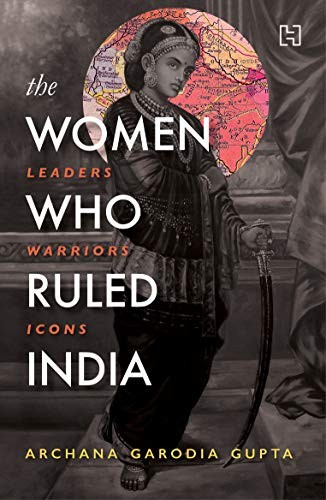299 pages
English language
Published Aug. 25, 2019 by Hachette India.

299 pages
English language
Published Aug. 25, 2019 by Hachette India.
‘People say that I am a quarrelsome woman...’ TARABAI, MARATHA QUEEN (1675–1761)
The history of India, more often than not, is a history of the men who were in charge. Largely forgotten are the women who, even centuries earlier, shaped the fates of entire kingdoms.
In The Women Who Ruled India, writer and researcher Archana Garodia Gupta revives 20 such powerful figures from the archives, offering us a glimpse of their fascinating lives. Among them are Begum Samru, a courtesan who went on to become the head of a mercenary army and the ruler of Sardhana; Didda of Kashmir, known for her keen political instinct and a ruthlessness that spared no one; Rani Abbakka of Ullal, the fearless queen who took on Portuguese colonizers in their heyday; and Rani Mangammal of Madurai, the famed administrator who built alliances at a time when going to war was the order of the …
‘People say that I am a quarrelsome woman...’ TARABAI, MARATHA QUEEN (1675–1761)
The history of India, more often than not, is a history of the men who were in charge. Largely forgotten are the women who, even centuries earlier, shaped the fates of entire kingdoms.
In The Women Who Ruled India, writer and researcher Archana Garodia Gupta revives 20 such powerful figures from the archives, offering us a glimpse of their fascinating lives. Among them are Begum Samru, a courtesan who went on to become the head of a mercenary army and the ruler of Sardhana; Didda of Kashmir, known for her keen political instinct and a ruthlessness that spared no one; Rani Abbakka of Ullal, the fearless queen who took on Portuguese colonizers in their heyday; and Rani Mangammal of Madurai, the famed administrator who built alliances at a time when going to war was the order of the day.
These women and others like them built roads, instituted laws and were generous patrons of the arts and sciences. Their stories of valour and diplomacy, leadership and wit continue to inspire today. Peppered with anecdotes that showcase little-known facets of their personalities, the accounts in this book celebrate heroic rulers who – ‘quarrelsome’ though they might have been – were iconoclasts: unafraid to forge new paths.